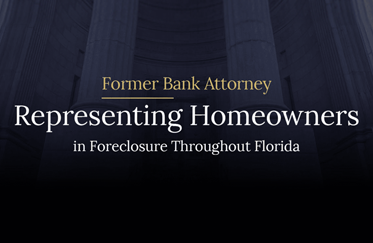I take calls on a regular basis from people who have purchased a property at a Florida Homeowner’s Association Foreclosure Sale and want to know whether the surplus funds can be used to pay off a previously unknown mortgage. The simple answer is no, these funds cannot be used to pay the mortgage. Many people believe this is “unfair” or “should be against the law”, etc. However, I have to explain to them that this is just how our laws are written here in the State of Florida.
For instance, a Homeowner’s Association or Condo Owner’s Association Foreclosure case is generally seeking past due assessments. These past due assessments and other costs may only amount to a few thousand dollars. For this scenario, we will say $15,000 was owed to the association. Perhaps the home is worth $300,000 dollars and you bid on it. You win the bidding for a price of $100,000. You just bought $300,000 property for far less than what it is worth. The association gets paid their $15,000 leaving Florida Foreclosure Sale Surplus Funds in the amount of $85,000. Now that you have bought the property and paid the clerk of court your funds, you find out there is still a mortgage on the property owing $250,000. Can the mortgage lender come after that $85,000 in surplus funds to pay down some of what is owed on the mortgage? No.
Florida Statute 45.033 states, “There is established a rebuttable presumption that the owner of record of real property on the date of the filing of a lis pendens is the person entitled to surplus funds after payment of subordinate lienholders who have timely filed a claim.” This means that the person who was the owner of record when the foreclosure case was filed and any subordinate lienholders are entitled to the surplus funds. A mortgage lienholder (lender) is not subordinate to an association. This was recently clarified (again) in a Second District Court of Appeals case called Goetz v. AGB Tampa, LLC. 335 So.3d 228. In this case, the mortgage lender filed a motion to intervene and for surplus funds in the homeowner’s association’s foreclosure case. There were Florida Foreclosure Sale Surplus Funds available in the amount of approximately $158,000 after the association’s foreclosure sale. The mortgage holder was owed approximately $118,000 on the mortgage plus fees and costs. The foreclosure court granted their motion and directed the clerk to give them the funds to pay off the mortgage.
The former homeowner appealed and based on a proper reading of Florida Statutes, the Second District Court of Appeals reversed the lower court’s decision. The Court stated, “because senior lienor’s rights are unaffected by foreclosure, holders of liens which are senior in priority have no right to share in a surplus produced by the foreclosure of a junior mortgage.” They further stated, “the Bank was neither an owner of record nor a subordinate lienholder,” and the former owner was “entitled to the surplus proceeds as a matter of law.” The mortgage lienholder is considered to be a senior lienholder, and therefore it was not able to take any Florida Foreclosure Sale Surplus Funds from the foreclosure case filed by the association.
To further explain this, I should point out that most of the other district courts of appeals and even the Florida Supreme Court have discussed this same issue. For example, the Fourth District Court of Appeals stated in a case called Garcia v. Stewaart, 906 So.2d 1117, “Senior lienors have no lien claim to a surplus produced by the foreclosure of a junior mortgage. Unlike their junior lien counterparts, their liens are unaffected by foreclosure and remain on the foreclosed real estate. They remain free to foreclose on the real estate, and thus there is no justification for transferring any part of their liens to the junior foreclosure surplus. This is true even where obligations secured by senior liens are in default.”
As you can see, based on Florida statute and Florida caselaw, there is no mechanism that allows for a senior lienholder to receive Florida Foreclosure Sale Surplus Funds from the foreclosure sale by a junior lienholder. This is just how the laws in Florida work. The courts also have stated that when someone purchases a property at a foreclosure sale, they take it subject to any liens still attached to the property. The Goetz case also stated, “recordation of an instrument constitutes constructive notice of a prior encumbrance on the property which is the subject of the instrument, that such notice is a legal inference, and that constructive notice is imputed to creditors and subsequent purchasers.” You must do your due diligence when you purchase a property at foreclosure sale and I always suggest running a title search before bidding.
If you are the former owner of property that has been sold at a foreclosure auction, please give me a call for a free consultation. I can help to make sure that only the proper subordinate or junior lienholders who have timely made a claim will be able to take anything from the surplus funds that lawfully belong to you. I handle Foreclosure Sale Surplus and Tax Deed Sale Surplus Funds in every County in the State of Florida, and I don’t get paid unless you do.
